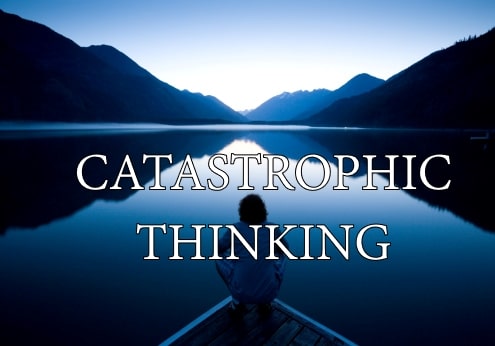Have you ever believed the worst about a situation that may or may not have happened? For instance, you call home from work, and your partner doesn’t answer. Immediately, you believe that there has been a horrible accident, and you just don’t know about it yet.
That is called catastrophic thinking.
This article will focus on this phenomenon and how to overcome this rumination of doom.
What is Catastrophic Thinking?

Catastrophic thinking is an anxious behavior that may be part of the symptoms of generalized anxiety disorder or other anxiety disorders. With catastrophic thinking, one thinks and ruminates on the worst possible scenario of what is or could happen. Most of the time, it is a subconscious thought pattern, and we are not aware we are dwelling on them.
The cause of catastrophic thinking depends upon the person involved. However, the main answer is that we often associate it with another mental health condition, such as obsessive-compulsive disorder (OCD) and dissociative identity disorder (DID).
There are two primary reasons people with an anxiety disorder, CPTSD, or OCD, have developed catastrophic thinking:
One, people with high-functioning anxiety disorders are trying to use logic to reason their way out of the apprehension they are experiencing. They feel they are protecting themselves by using catastrophic thinking by being ready for the next shoe to drop. However, planning for the worst increases their anxiety, and their catastrophic thinking is soon a runaway train of emotions and fear.
Two, anxious people have a deep-seated fear of failure, and so they imagine the worst-case scenario because an actual real-world incident has triggered their fear. For instance, perhaps a coworker has received his pink slip, or a family member becomes ill; a person may fall into catastrophic thinking, fantasizing what they will do when they become unemployed or when that family member dies.
Recognizing Catastrophic Thinking
 It is easy to see where catastrophic thinking begins. If one has grown up in a highly dysfunctional home, they trained us from birth to expect and fear the unexpected. Our parents were not predictable and were unreliable to meet our needs, and often we faced abuse from them that was repetitive and horrendous.
It is easy to see where catastrophic thinking begins. If one has grown up in a highly dysfunctional home, they trained us from birth to expect and fear the unexpected. Our parents were not predictable and were unreliable to meet our needs, and often we faced abuse from them that was repetitive and horrendous.
As adults, we grew up in these harmful homes, and this left us with scars. Catastrophic thinking is one of the wounds left in our psyche. Recognizing catastrophic thinking is often difficult until you name it for what it is.
When we experience anxiety, catastrophic thoughts can seem like they are forever present and hold impending realities. Recognizing these painful and frightening thought patterns can help avoid going down the rabbit hole of thinking that our world is about to end.
Here are some tips for recognizing catastrophic thoughts.
Watch out for what-if statements. When you think of a catastrophic line of thinking, such as “what if I get sick and lose my job, then I’ll be homeless….” What-if statements often lead to catastrophic thinking.
You cannot focus on the positive. Catastrophic thinking focuses on the worst-case scenario of a situation. If you cannot think of positive alternatives for your situation, you may be caught up in a loop of catastrophic thinking.
You overthink things. Overthinking involves desperately preparing yourself for how a situation will be handled by thinking about it insistently. This is a red flag that you are experiencing anxiety-driven catastrophic thinking.
Overcoming Catastrophic Thinking

While catastrophic thinking is challenging to escape, it is definitely not impossible, and below are three suggestions on how you can reshape your thinking.
Suggestion one, recognize catastrophic thinking for what it is, and if you are unsure if you are experiencing this cognitive problem, ask a therapist or life coach to help you.
Suggestion two, think and focus on the positive intentionally. Instead of worrying about that mole on your arm and all it could mean, concentrate instead on what steps you need to take to check it out, such as going to the doctor. Focus on the fact that you will feel better once you get the mole checked out because it is probably not skin cancer. Concentrate on the facts on hand and stop yourself from catastrophizing what might happen.
Suggestion three, stop ruminating on your obsessive thoughts. While this may be harder than it sounds, it is vital to change the subject in your mind or do what is necessary to calm yourself. If there is nothing you can do about the situation you’re ruminating on, it will not help. Use mindfulness to help you escape the trap of ruminating thoughts and catastrophic thinking.
My Personal Experience with Catastrophic Thinking
I do not write this article about catastrophic thinking without knowing what it is like. I, too, have suffered from the fear and panic that can accompany these cognitive storms.
On one Saturday, I was in crisis and tried to call my therapist. Her phone was busy. Okay, I thought, I’ll just call back later.
However, I tried to call her at least twenty times more, and her phone was always busy. In my mind, I catastrophized that her not answering her phone was because she recognized my number and was sick of hearing from me. I decided my therapist was going to quit me, and I was desperate to hear from her.
That was a weekend I do not wish ever to experience again.
The following Monday, I had an appointment with my therapist, and the first thing to come out of my mouth was to ask her why she didn’t answer the phone, fully expecting her to say because I didn’t want to talk to you. Instead, she sat back in her chair, startled, and told me her six-year-old daughter had played with the phone, and they couldn’t find it. When they did, the battery was dead.
I was embarrassed, but my therapist and I could work through my catastrophic thinking, and I learned an important lesson.
Catastrophic thinking is painful, frightening, and often terrifying for those who experience it, but it can be overcome, as stated above.
“Don’t get too deep; it leads to overthinking, and overthinking leads to problems that don’t even exist in the first place.” ~ Jayson Engay
“A crowded mind
Leaves no space
For a peaceful heart.”
~ Christine Evangelou

Holiday Encouragement from CPTSD Foundation

Could you use some extra encouragement during the holiday season? How about one email a day to help you navigate the stress of the holiday season? Sign up for FREE at https://cptsdfoundation.org/winter
CPTSD Foundation Awareness Wristbands

Official CPTSD Foundation wristbands to show the world you support awareness, research, and healing from complex trauma.
The official CPTSD Foundation wristbands were designed by our Executive Director, Athena Moberg, with the idea that promoting healing and awareness benefits all survivors. We hope you’ll consider purchasing one for yourself and perhaps one for a family member, friend, or other safe people who could help raise awareness for complex trauma research and healing.
Each purchase of $12 helps fund our scholarship program, which provides access to our programs and resources to survivors in need.
https://cptsdfoundation.org/cptsd-awareness-wristband/
If you’ve been wondering how our programs work, now you can try out a free sample to see if they’re right for you. We’d love to have you join us in our safe healing space.
You are always worth healing!
Do you like to color, paint, sew, arts & crafts? How about drawing, model building, or maybe cross stitch? Whatever creative activity you prefer, come join us in the Weekly Creative Group. Learn more at https://cptsdfoundation.org/weeklycreativegroup
As always, if you or a loved one live in the despair and isolation that comes with complex post-traumatic stress disorder, please come to us for help. CPTSD Foundation offers a wide range of services, including:
- Daily Calls
- The Healing Book Club
- Support Groups
- Our Blog
- The Trauma-Informed Newsletter
- Daily Encouragement Texts
All our services are reasonably priced, and some are even free. So, to gain more insight into how complex post-traumatic stress disorder is altering your life and how you can overcome it, sign-up; we will be glad to help you. If you cannot afford to pay, go to www.cptsdfoundation.org/scholarship to apply for aid. We only wish to serve you.

My name is Shirley Davis and I am a freelance writer with over 40-years- experience writing short stories and poetry. Living as I do among the corn and bean fields of Illinois (USA), working from home using the Internet has become the best way to communicate with the world. My interests are wide and varied. I love any kind of science and read several research papers per week to satisfy my curiosity. I have earned an Associate Degree in Psychology and enjoy writing books on the subjects that most interest me.





Trackbacks/Pingbacks